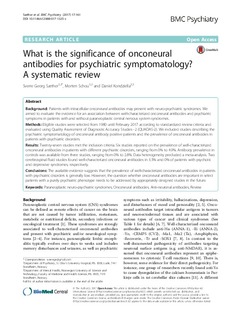What is the significance of onconeural antibodies for psychiatric symptomatology? A systematic review
Journal article, Peer reviewed
Published version
Permanent lenke
http://hdl.handle.net/11250/2452155Utgivelsesdato
2017Metadata
Vis full innførselOriginalversjon
10.1186/s12888-017-1325-zSammendrag
Background:Patients with intracellular onconeural antibodies may present with neuro-psychiatric syndromes. Weaimed to evaluate the evidence for an association between well-characterized onconeural antibodies and psychiatricsymptoms in patients with and without paraneoplastic central nervous system syndromes.Methods:Eligible studies were selected from 1980 until February 2017 according to standardized review criteria andevaluated using Quality Assessment of Diagnostic Accuracy Studies−2 (QUADAS-2). We included studies describing thepsychiatric symptomatology of onconeural antibody positive patients and the prevalence of onconeural antibodies inpatients with psychiatric disorders.Results:Twenty-seven studies met the inclusion criteria. Six studies reported on the prevalence of well-characterizedonconeural antibodies in patients with different psychiatric disorders, ranging from 0% to 4.9%. Antibody prevalence incontrols was available from three studies, ranging from 0% to 2.8%. Data heterogeneity precluded a meta-analysis. Twocerebrospinal fluid studies found well-characterized onconeural antibodies in 3.5% and 0% of patients with psychoticand depressive syndromes, respectively.Conclusions:Theavailableevidencesuggeststhattheprevalenceofwell-characterized onconeural antibodies in patientswith psychiatric disorders is generally low. However, the question whether onconeural antibodies are important in selectpatients with a purely psychiatric phenotype needs to be addressed by appropriately designed studies in the future.

